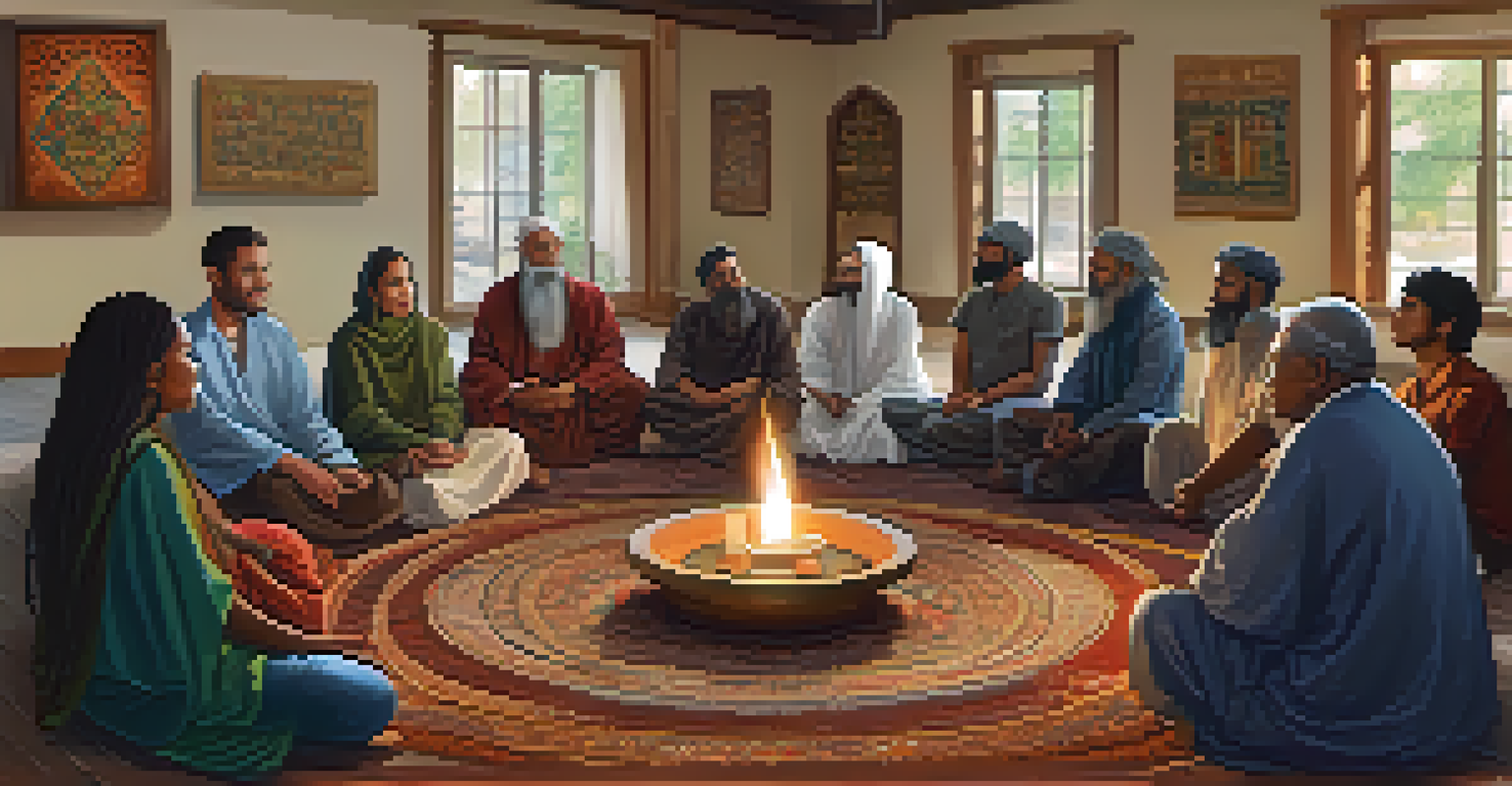Cultural Perspectives on Spirituality and the Human Experience

Understanding Spirituality Across Cultures
Spirituality is a broad concept that encompasses various beliefs and practices across cultures. It often reflects an individual's search for meaning, connection, and purpose in life. While some cultures emphasize organized religion, others may focus on personal experiences or connections to nature.
Spirituality is not about religion. It is about a personal journey to connect with the universe and understand the meaning of life.
For instance, Indigenous cultures often integrate spirituality into daily life, viewing the natural world as sacred. This contrasts with Western perspectives, where spirituality can sometimes be more abstract and individualistic. Understanding these differences helps us appreciate the rich tapestry of human experience.
By exploring these diverse views, we can see how spirituality shapes cultural identity and community values. It also highlights the importance of context when discussing spiritual beliefs, reminding us that there's no one-size-fits-all approach to understanding this profound aspect of life.
The Role of Rituals in Spiritual Practices
Rituals serve as a cornerstone in many spiritual traditions, providing structure and a sense of belonging. They can range from daily prayers to elaborate ceremonies marking significant life events. These practices not only connect individuals to their faith but also to their communities.

For example, in Hinduism, rituals such as Puja (worship) play a vital role in daily life, allowing practitioners to connect with the divine. Similarly, Christian rites like baptism signify important spiritual milestones. Through these rituals, individuals find comfort and a sense of continuity in their spiritual journey.
Diverse Spirituality Shapes Identity
Spirituality varies across cultures, reflecting unique beliefs and practices that influence community values and individual identity.
Moreover, rituals often help us navigate life's challenges, offering a framework for expressing grief, joy, and gratitude. They remind us that spirituality is not just a personal experience but also a communal one, reinforcing bonds between individuals and their cultures.
Cultural Narratives and Spiritual Beliefs
Every culture has its own narratives that shape spiritual beliefs and practices. These stories often reflect moral values, historical experiences, and the environment in which a culture develops. For example, creation myths can explain the origins of the universe and humanity's place within it.
Nature is not a place to visit. It is home.
In African cultures, oral traditions and storytelling are vital in passing down wisdom and spiritual teachings. Similarly, Native American folklore often emphasizes the interconnectedness of all living beings. These narratives not only provide meaning but also serve as a guide for ethical living.
By engaging with these cultural narratives, we gain insights into how spirituality influences community behavior and societal norms. They also reveal the diversity of spiritual experiences, highlighting how different contexts shape individual and collective understandings.
Nature and Spirituality: A Universal Connection
Many cultures find deep spiritual significance in nature, viewing it as a source of inspiration and connection. From ancient civilizations that worshipped natural elements to modern practices like eco-spirituality, the bond between nature and spirituality is profound. It reflects our innate desire to connect with something greater than ourselves.
For instance, in Shintoism, the belief that spirits inhabit natural elements fosters a sense of reverence for the environment. Similarly, in many Indigenous cultures, land is considered sacred and integral to spiritual identity. These views encourage a harmonious relationship between humans and nature.
Rituals Foster Community Connection
Rituals play a crucial role in spiritual traditions, providing structure and a sense of belonging while connecting individuals to their faith and communities.
Engaging with nature can also enhance personal spirituality, providing peace and clarity. Hiking through a forest or meditating by a river allows individuals to reflect on their place in the world, reinforcing the idea that spirituality is intertwined with the natural environment.
The Influence of Modernity on Spiritual Practices
As societies evolve, so too do their spiritual practices, often influenced by modernity and globalization. Technology has transformed how individuals engage with spirituality, offering new avenues for exploration and expression. Online communities and digital resources provide support and connection for those seeking spiritual growth.
For example, social media platforms allow individuals to share spiritual experiences and practices across borders, fostering a global dialogue. However, this shift can also lead to a dilution of traditional practices as they adapt to modern contexts. Balancing tradition with contemporary influences can be challenging yet enriching.
Ultimately, modernity presents both opportunities and hurdles for spiritual exploration. While it can enhance accessibility and connection, it also raises questions about authenticity and cultural preservation, reminding us of the importance of honoring diverse spiritual paths.
Interfaith Dialogue: Bridging Cultural Differences
Interfaith dialogue plays a crucial role in fostering understanding among diverse spiritual traditions. By engaging with different belief systems, individuals can learn about the values and practices that shape various cultures. This dialogue promotes respect and empathy while highlighting commonalities in the human experience.
Many organizations and communities host interfaith events to encourage discussions on spirituality and ethics. These gatherings often create safe spaces for individuals to share their beliefs and experiences, paving the way for collaboration and mutual respect. Such exchanges can dispel misconceptions and build bridges between differing perspectives.
Modernity Transforms Spiritual Practices
The influence of modernity and globalization offers new avenues for spiritual exploration, while also raising concerns about the authenticity of traditional practices.
Through interfaith dialogue, we can cultivate a more inclusive understanding of spirituality. It emphasizes that despite our differences, we all seek connection, meaning, and understanding in our lives, reinforcing the idea that spirituality is a shared human endeavor.
The Future of Spirituality in a Globalized World
As the world becomes increasingly interconnected, the future of spirituality is likely to evolve in fascinating ways. Globalization brings diverse spiritual practices into closer contact, prompting individuals to reassess their beliefs and explore new ones. This convergence can lead to innovative spiritual expressions and hybrid practices.
However, this blending of traditions also raises concerns about cultural appropriation and the loss of authenticity. It's essential to approach spiritual exploration with respect, honoring the richness of each tradition while acknowledging their origins. Understanding the cultural context is vital to fostering genuine connections.

Looking ahead, the challenge will be to embrace this diversity while maintaining respect for individual traditions. The future of spirituality may well be a tapestry woven from various threads, reflecting the beautiful complexity of the human experience as we navigate our shared journey.